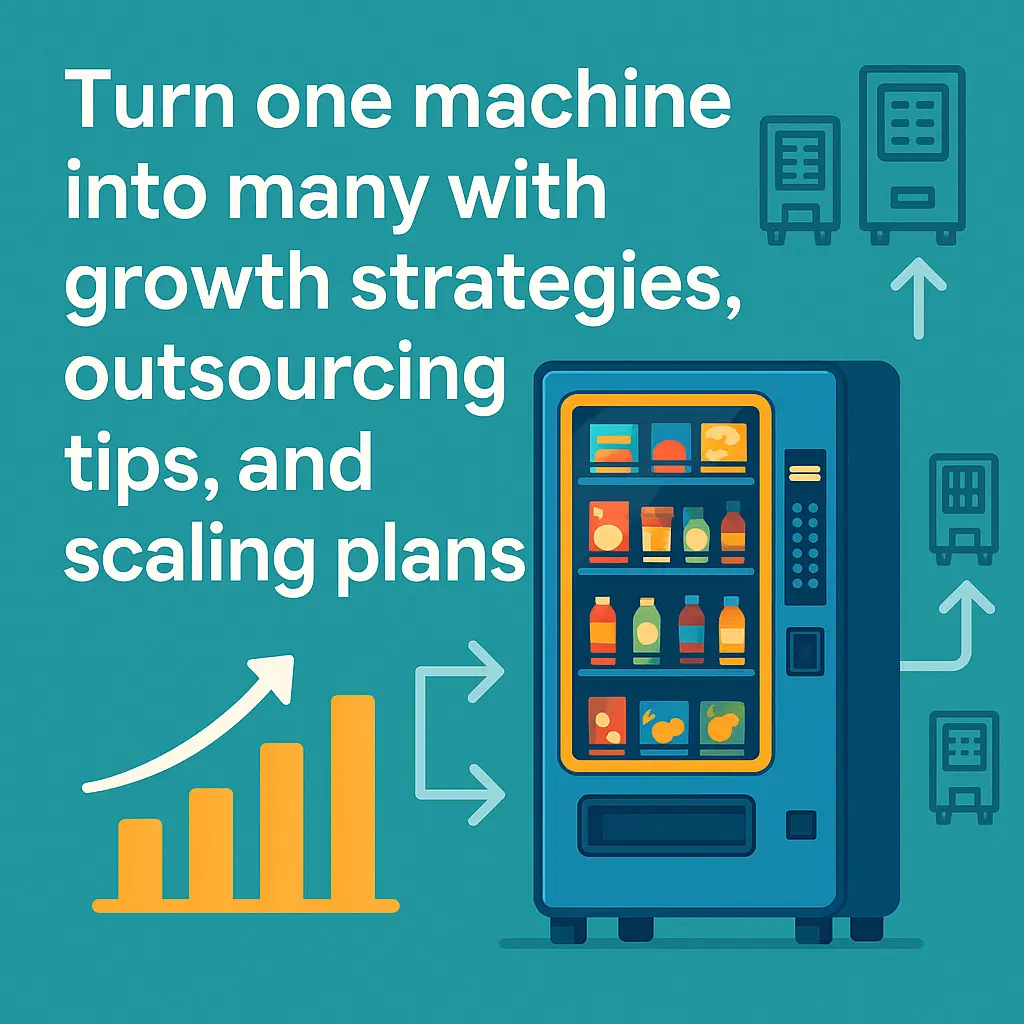How to Grow Your Vending Business
Turn one machine into many with growth strategies, outsourcing tips, and scaling plans.
Back to Vending Business Startup ResourcesTurn one machine into many with growth strategies, outsourcing tips, and scaling plans.
Back to Vending Business Startup ResourcesStart your 30-day free trial and get instant SMS and email alerts whenever a local business needs vending service. These are real location leads to help you grow your route — you decide which ones to buy, no obligations or contracts.
![]() Outsourcing restocking saves you hours each week
Outsourcing restocking saves you hours each week
![]() Bundle machine placements for better vendor-negotiated rates
Bundle machine placements for better vendor-negotiated rates
![]() Smart tech lets you monitor multiple machines remotely
Smart tech lets you monitor multiple machines remotely
30 days free, then $39 / month.
No Commitment. Cancel Anytime.

Growing a vending business requires both strategic thinking and operational efficiency. Whether you're starting with one machine or a small route, scaling successfully means knowing when and how to expand. Start by analyzing your most profitable machines and product categories. Machines in high-traffic areas with strong sales data should signal where to seek similar placements nearby.
Outsourcing is a key strategy for growth. As you add more machines, your time will be stretched thin—especially when it comes to restocking, equipment service, and product rotation. Consider partnering with local vending operators who offer white-label stocking or servicing. You can maintain ownership while others handle daily logistics.
Incorporating smart vending technology also supports scalability. Features like remote inventory monitoring, real-time sales tracking, and contactless payments reduce downtime and increase transparency. These systems let you manage five or fifty machines with the same ease—no need to visit each location every day.
Another powerful method for scaling quickly is financing new machines rather than purchasing outright. Leasing or using third-party vending financing helps maintain cash flow and offset startup risks. Just make sure to calculate expected returns in relation to your debt load.
To drive steady, reliable growth, look for volume opportunities—such as apartment complexes, office buildings, and school campuses. Locations with multiple machines or long-term placement potential provide a consistent base of recurring revenue. Resources that connect vending operators with vetted location leads can dramatically shorten your sales cycle and improve ROI.
For more insight on upfront investments, check out this breakdown of vending financing options to identify the right structure for your budget. And if you're weighing multiple side income ideas, read our comparison of vending vs. other side hustles to better understand vending’s unique scalability potential.
Vending Exchange connects vending operators with real businesses actively looking for vending services—including traditional machines, AI coolers, and office coffee. Get instant SMS and email alerts when new opportunities are available in your area. No contracts or monthly fees—just buy the leads you want. Start your free 30-day trial today and grow your vending business on your terms.
To scale, focus on high-performing locations, streamline operations and consider outsourcing restocking and servicing.
Consistent product sell-through, profit stability, and excess demand at current locations signal readiness to grow.
Use smart technology for remote inventory tracking and automated notifications to reduce manual checks.
Leasing and vending machine loans help you spread payments and invest in placements without draining capital.
Yes, outsourcing can save time, improve uptime, and help operators focus on strategic growth decisions.
Target high-traffic sites like schools and offices, or work with lead services that pre-qualify businesses.
Use machines with telemetry, credit card readers, and real-time dashboards for performance tracking.
Yes, with smart systems and outsourcing, many owners scale their routes while managing other work.
Offer niche product selections, personalized service, and faster response to location needs and issues.
Many expand too fast without solid logistics or backup, leading to missed refills and service gaps.